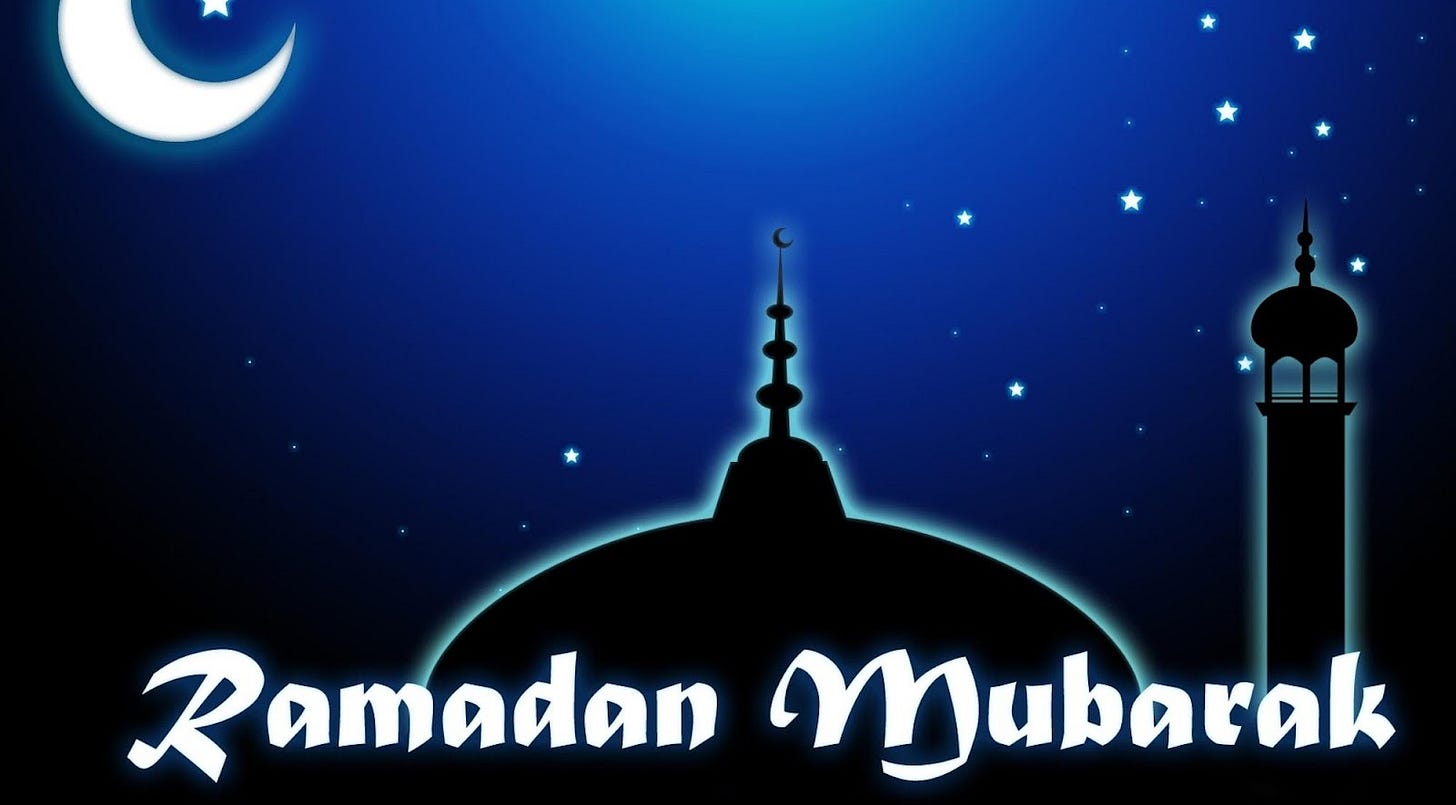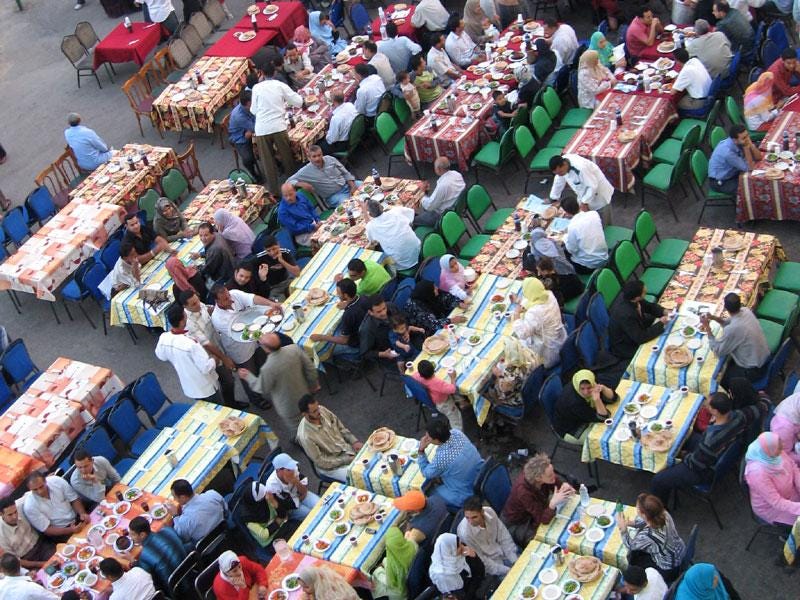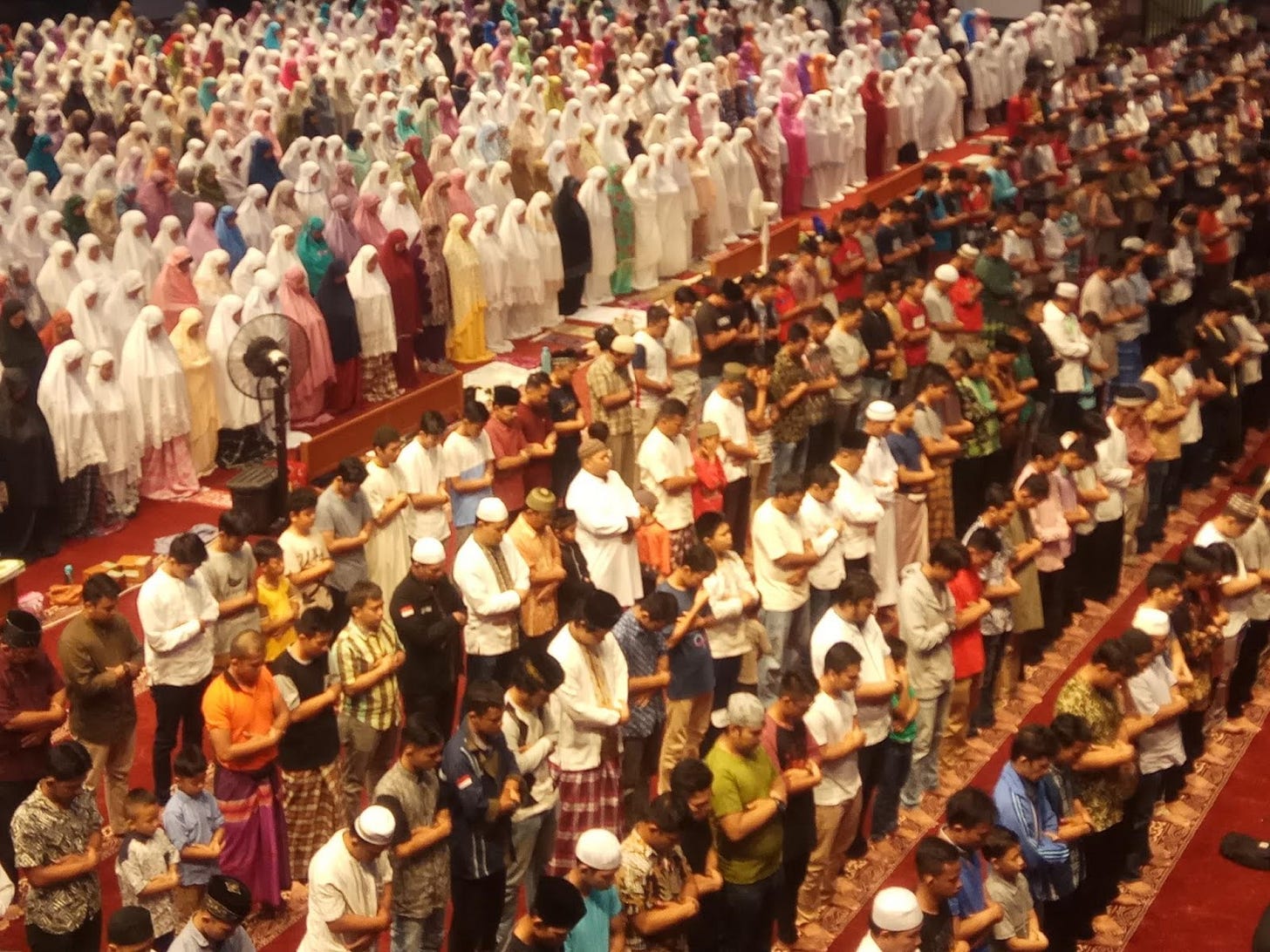
What is Ramadan?

Ramadan is the month where Muslims from around the world fast from sunrise to sunset. The month lasts for either 29 or 30 days, and the start and end of the month are determined by the sightings of the moon. During the period of the day between sunrise and sunset, Muslims abstain from food and drink (including water) and focus on building a connection with God/Allah (SWT) and self-improving in every aspect of their lives. Ramadan is called the Month of the Quran because it is the month in which the Quran was revealed. Fasting during this month is the fourth pillar of Islam. Ramadan teaches Muslims to be grateful for the blessings in their lives, including food and drink, and the holy book of the Quran, which was revealed in this month.
Does Everyone Have to Fast?

During Ramadan, every Muslim above the age of puberty who is physically capable of fasting is required to fast. That being said, there are a few exceptions to the rule:
Travelers: The person who is on a journey has a choice about whether or not they fast. The person on a journey can choose to fast if they think that fasting won’t be hard or harmful for them. A traveler who fears fasting will be difficult can also choose not to fast. The person who does not fast during their journey is required to make up the fasts they missed before the next Ramadan.
Women who are in postnatal bleeding: A woman cannot fast while she is in her postnatal bleeding state. She is required to make up the fasts that she has missed before the next Ramadan.
Those who are unwell: If someone is unwell, then they are not required to fast during the month of Ramadan while they are unwell. This person is required to make up the fasts they have missed before the next Ramadan.
Menstruating Women: If a woman is menstruating, she cannot fast for as long as she is menstruating. She is required to make up the fasts that she has missed before the next Ramadan.
Those who can fast but with difficulty: For those who can fast but have difficulty fasting due to health reasons, they can fast as much as they are able to, but for every day they are unable to fast, they can make it up by feeding a poor person equivalent to the number of days that they did not fast.
Pregnant Women: Pregnant women are allowed to fast if they wish; if the woman fears that fasting will harm either herself or her child, she does not have to fast. She can either make up the fasts at a later date or she can make up the fasts by feeding a poor person equivalent to the number of days that she did not fast.
Those who are unable to fast: Many individuals who have medical conditions or who are of an advanced age may not be able to fast without harming themselves. In this scenario, they can make up the fasts by feeding a poor person equivalent to the number of days that they did not fast.
Breastfeeding Women : Breastfeeding women can choose whether or not to fast. Many breastfeeding women choose to fast, but for those who fear that fasting will harm their health or the health of their baby, they can choose not to fast. Breastfeeding mothers can make up the fasts before the next Ramadan.
What is the main goal of Ramadan?

Abstaining from food and drink is only part of the goal in Ramadan. The month of Ramadan is a month of self-improvement where Muslims focus on strengthening their relationship with Allah (SWT) and their communities. The goal of Ramadan is to develop gratitude for the blessings that Allah (SWT) has provided in their lives.
It is a month of self-reflection and small acts of self-improvement to make a person a better person and a better Muslim; whether it is through helping their families prepare for suhoor and iftar or through giving charity to others, trying to avoid anger and foul language, or spending time remembering Allah or reading the Quran, Muslims utilize various methods to self-improve in all aspects of life during the month of Ramadan.
Many Muslims increase their recitation of the Quran, their remembrance of Allah (SWT), and their voluntary prayers to maximize the possible rewards gained during this blessed month and focus on becoming closer to both Allah (SWT) and their communities. Additionally, many Muslims focus on charity and helping their families because Ramadan is a time to self-improve in all aspects of life while also developing gratitude for all the blessings in their lives.
Special Events and Activities during Ramadan

Tarawih: These are daily voluntary prayers that can only be performed during Ramadan. These prayers are performed after the obligatory night prayer, Isha. Tarawih prayers are usually prayed in 2 units of prayers until a Muslim decides to stop at either 8 or 20 units of prayer. Tarawih is usually performed in mosques, but those who can't go at night can do it at home.
Increased Acts of Worship: During Ramadan, many Muslims increase their acts of worship to maximize their blessings during this month . This takes many forms, such as increased voluntary prayers, more recitation of the Quran, more remembrance of Allah (SWT) , and more charity, amongst other acts of worship
Suhoor/Iftar: Suhoor (Sehri) is the predawn meal that Muslims eat before fasting for the day. While suhoor is not mandatory , it contains many blessings and helps Muslims stay full throughout the day. Iftar (Iftari) is the meal that Muslims eat to break their fast. This is a meal of gratitude where Muslims express their gratitude for the blessings that Allah (SWT) has provided.
Itikaf (Seclusion): Itikaf is a voluntary period of isolation that some Muslims do during the last ten nights of Ramadan where they focus on worshipping Allah (SWT). Men can perform seclusion in the mosque where they can attend the congregational prayers, whereas women can perform itikaf either at the masjid or in a private room at home. During itikaf, Muslims focus on acts of worship such as reading the Quran, supplicating to Allah (SWT), prayer , making repentance, etc.
Laylatul Qadar ( The Night of Decree/Power): Laylatul Qadar, or The Night of Decree/Power, is the most special night of the year. The Night of Decree is the night when the Quran was first revealed to the Prophet Muhammad ( ﷺ / PBUH ) through the angel Jibril/Gabriel (AS). The night is worth more than a thousand months, and every good deed is multiplied on that night. It's a night of peace—from sunset until sunrise the next day . This night is found on the last ten nights of Ramadan, particularly the odd nights of the last ten nights of Ramadan, but the exact night is unknown, so Muslims exert themselves throughout the last ten nights in the hopes of catching this blessed night.
Ramadan is a time of blessings, gratitude, and spiritual connection to Allah (SWT). It is the month in which the Quran was revealed and it is a month where Muslims get to self-improve in all aspects of life while also developing gratitude for all the blessings in their lives.



